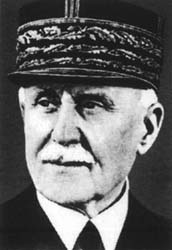Marshal Henri Philippe Pétain
 Henri Pétain was a military and political leader and Franceīs greatest
hero in World War I (1914-1918). He was later condemned as a traitor for
having headed the pro-German Vichy regime after France's defeat in World
War II (1939-1945).
Henri Pétain was a military and political leader and Franceīs greatest
hero in World War I (1914-1918). He was later condemned as a traitor for
having headed the pro-German Vichy regime after France's defeat in World
War II (1939-1945).
Born in Cauchy-ó-la-Tour in 1856, Pétain was educated at the Saint-Cyr
military academy and the École Supérieure de Guerre (army war college) in
Paris. As a general during World War I, he won fame for his successful
defense of Verdun against the Germans in 1916. Later, as commander in
chief, he did much to restore morale in the French army after a series of
mutinies in 1917. He was made a marshal of France the following year.
During the 1920s Pétain served in French Morocco. In 1934 he was minister
of war, and from 1939 to 1940 he was ambassador to Spain.
Following the German invasion of France in 1940, Pétain - then 84 years
old - was recalled to active military service as adviser to the minister of
war. On June 16, 1940, he succeeded Paul Reynaud as premier of France and
soon afterward he asked the Germans for an armistice, which was concluded
on June 22. On July 2, with the consent of the Germans, he established his
government in Vichy in central France, and on July 10 he assumed the title
of chief of state, ruling thereafter with dictatorial powers over that
portion of France not directly under German control. Pétain and his prime
minister, Pierre Laval, established a Fascist-oriented government that
became notorious for its collaboration with German dictator Adolf Hitler.
The Vichy government ruled with Germany's approval, appointing all
government officials, controlling the press, and practicing arbitrary
arrests. The government also passed anti-Semitic laws and rounded up
French, Spanish, and Eastern European Jews who were deported to German
concentration camps.
After the Allies landed in France in 1944, Pétain went to Germany and then
to Switzerland. He returned to France after the war to stand trial for
treason. In August 1945 he was found guilty of „intelligence with the
enemyš and sentenced to death. The sentence was commuted to life
imprisonment, and he was moved to Ile d'Yeu, an island off the coast of
Brittany, where he died.
|

